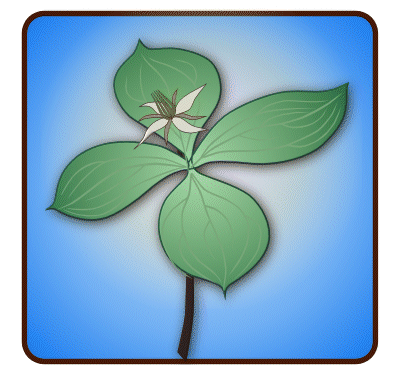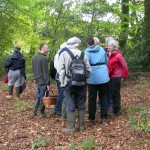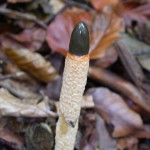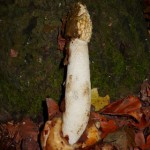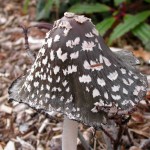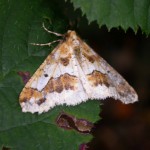On Sunday 30th October, Gordon Crutchfield led a fungus foray at Lambridge Wood and Famous Copse, in the Chilterns to the north-west of Henley. The autumn colours were approaching their best, and thanks to the rain in the previous week, there were reasonable numbers of fungi around. Two different kinds of Stinkhorn were found – the common variety, and the smaller and thinner Dog Stinkhorn. In its early stage, the Stinkhorn is egg-shaped, with a gelatinous layer round a firm nut-like centre – which 2 of the braver members of the group tried and agreed that it tasted like raw potato. Boletus pruinatus was another tasty specimen which was nibbled by a few people.
Mycena crocata is one of the specialities of the Chiltern beech woods. Gordon demonstrated that its stem exudes an orange liquid when squeezed. Mycena pelianthina had gills with a darker purple edge. Members with a good sense of smell could compare the radish scent of Mycena rosea with the raw potato smell of Ammonita citrina, the False Death Cap. The fluid exuded from Lactarius tabidus stained yellow on paper. Collybia confluens was found in dense tufts, forming part of a large ring. Other finds included the Magpie Inkcap, the Blushing Bracket, which flushed pink when scraped, and the gelatinous Neobulgaria pura on a beech branch. A few moths were disturbed, including several November Moth types and a Mottled Umber.
Pictures by David Owens and Jan Haseler
Lambridge Wood and Famous Copse, 30 Oct 2011
The following fungi were identified in the field (without microscopic confirmation):
| Russula ochroleuca | Ochre Brittlegill |
| Lactarius tabidus | Birch Milkcap |
| Mycena galericulata | Common Bonnet |
| Mycena crocata | Saffrondrop Bonnet |
| Mycena vitilis | Snapping Bonnet |
| Mycena rosea | |
| Mycena pelianthina | Blackedge Bonnet |
| Clitocybe nebularis | Clouded Agaric |
| Clitocybe gibba | Common Funnel |
| Clitocybe flaccida | Tawny Funnel Cap |
| Clitocybe vibecina | Mealy Funnel |
| Collybia confluens | Clustered Toughshank |
| Collybia dryophila | Russet Toughshank |
| Collybia peronata | Wood Woollyfoot |
| Amanita citrina | False Death Cap |
| Paxillus involutus | Brown Rollrim |
| Psathyrella sp. | |
| Coprinus picaceus | Magpie Inkcap |
| Paneolus sp. | |
| Pleurotus sp. | |
| Crepidotus variabilis | Variable Oysterling |
| Boletus cisalpinus | |
| Boletus pruinatus | Matt Bolete |
| Polyporus squamosus | Dryad’s Saddle |
| Ganoderma australe | Southern Bracket |
| Daedaleopsis confragosa | Blushing Bracket |
| Stereum hirsutum | Hairy Stereum |
| Trametes gibbosa | Lumpy Bracket |
| Trametes versicolor | Turkey Tails |
| Piptoporus betulinus | Birch Polypore |
| Mycoacia uda | |
| Phallus impudicus | Stinkhorn |
| Mutinus caninus | Dog Stinkhorn |
| Auricularia auricula-judae | Jelly Ear |
| Neobulgaria pura | Beech Jellydisc |
| Xylaria hypoxylon | Stag’s Horn |
| Hypoxylon fragiforme | Beech Woodwort |
| Biscogniauxia nummularium | Beech Tarcrust |
| Amanita vaginata var alba |
identified by Gordon Crutchfield
Moths
Mottled Umber
November Moth agg
